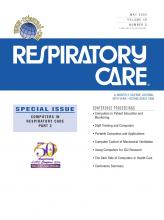Abstract
Computing technologies offer much promise in the field of medicine. Every discipline in medicine has been affected by the proliferation of computerized technology. Clinicians face challenges in balancing constraints of time and personnel resources when caring for and educating patients. The potential value of computer technology is tremendous and expectations run high among providers and patients. Computers can help patients to synthesize knowledge from information and to retain information about diseases. Computer and communication technologies can extend the caregiver's reach with remote patient monitoring. Health care providers' roles are changing because of the availability of health information on the Internet. Computer-based patient education can help improve the patient's awareness and understanding of his or her disease(s), which can help make the patient more of a partner in the patient-physician relationship. Currently, there are some limitations to and issues about using computers for patient education and monitoring, but I expect those limitations and issues to be substantially mitigated in the future.
Footnotes
- Correspondence: Thomas E Belda RRT, Department of Anesthesiology, Mayo Clinic, 200 First Street SW, 2-114 Old Marian Hall, Rochester MN 55905. E-mail: belda.thomas{at}mayo.edu.
Thomas E Belda RRT presented a version of this report at the 33rd Respiratory Care Journal Conference, Computers in Respiratory Care, held October 3-5, 2003, in Banff, Alberta, Canada.
- Copyright © 2004 by Daedalus Enterprises Inc.







